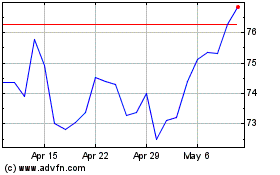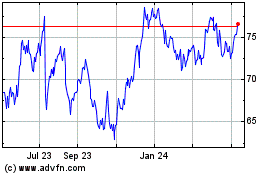Warren Buffett Leads Parade of Apple Winners
August 02 2018 - 6:05PM
Dow Jones News
By Nicole Friedman, Asjylyn Loder and Tripp Mickle
Apple Inc.'s rise above $1 trillion in stock-market value has
enriched billionaires and everyday investors.
One of the biggest winners: Warren Buffett. His Berkshire
Hathaway Inc. is the tech giant's second largest shareholder with a
roughly 5% stake.
Berkshire first purchased Apple shares in the first quarter of
2016. The company bought around $1 billion worth of stock at a
price of $99.02 a share, according to FactSet, or for less than
half of what Apple trades for today.
Berkshire steadily increased its stake, investing more than $30
billion between the first quarter of 2016 and the first quarter of
2018, according to FactSet and company filings. Apple was
Berkshire's largest equity holding, as of March 31 filings, and
would be worth nearly $50 billion based on Thursday's price.
Mr. Buffett has historically shied away from investing in
technology companies, but he has said he likes Apple because it is
a retail business with a strong brand.
Plenty of other investors have gained with Apple, too, given it
is such a widespread holding among mutual funds and exchange-traded
funds.
U.S. mutual funds and exchange-traded funds own almost 1.1
billion shares of Apple, about 21% of the company's stock,
according to Morningstar. Those shares are worth almost $220
billion today.
The exchange-traded fund, or ETF, with the most Apple stock is
State Street Corp's $274 billion SPDR S&P 500 ETF, the biggest
fund of its kind globally and one of the world's most traded
securities. It holds 55.8 million Apple shares.
The ETF with the highest exposure is the $4.1 billion iShares
U.S. Technology ETF with about 17% of its portfolio invested in
Apple, according to ETF.com.
Meanwhile, index fund giants including Vanguard Group, BlackRock
Inc. and State Street are among Apple's biggest shareholders.
Vanguard is the tech company's biggest shareholder, with more than
342 million shares, according to FactSet. The three fund firms have
a combined Apple stake of almost 16%, spread across dozens of
mutual funds and ETFs.
Some of the biggest beneficiaries of Apple's gains have been
early shareholders who never lost faith in the company, even as it
flirted with failure in the mid-1990s.
Mark Coughlin, who worked for a company that sold Apple's early
computers, was given about 1,000 initial shares in Apple in 1980
and earned more shares in 1981 through an incentive program. He
said those shares, accounting for splits over nearly four decades,
were valued around 51 cents a share.
When former Chief Executive John Sculley ousted Steve Jobs in
1985, Mr. Coughlin sold some shares but kept most of them. When Mr.
Jobs returned, he began buying more, adding so much that he
estimates about 60% of his net worth is in Apple stock.
"My financial adviser has scolded me every year for 15 years
about it, but I was sold on Jobs as a person, who I'd met in those
early years, and was a believer in him," said Mr. Coughlin, a
longtime sports marketing executive now with Envy Gaming, Inc. "If
something terrible happened, my paper loss would be huge but I
would still be way ahead. It's done pretty good by me."
After leading Apple from 1983 to 1993, Mr. Sculley said he sold
most of his shares. However, about six years ago, he began buying
Apple stock again, largely because of the power of the iPhone and
other products Mr. Jobs developed after returning as chief
executive in 1997.
One of the things that most impresses Mr. Sculley today is the
way Chief Executive Tim Cook is returning cash to Apple
shareholders through share repurchases and dividends. In May, Apple
announced $100 billion in share repurchases, the largest ever
announced by a company.
"Just like Apple locks in loyalty with its beautiful marketing
and products' ease of use, it now has a financial strategy that
locks in shareholders," Mr. Sculley said.
Write to Nicole Friedman at nicole.friedman@wsj.com, Asjylyn
Loder at asjylyn.loder@wsj.com and Tripp Mickle at
Tripp.Mickle@wsj.com
(END) Dow Jones Newswires
August 02, 2018 17:50 ET (21:50 GMT)
Copyright (c) 2018 Dow Jones & Company, Inc.
State Street (NYSE:STT)
Historical Stock Chart
From Jun 2024 to Jul 2024

State Street (NYSE:STT)
Historical Stock Chart
From Jul 2023 to Jul 2024
